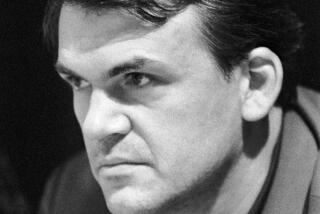Havel: A Man in Search of an Ideal
- Share via
Of all the noble souls thrust into prominence in the thrilling months since tyranny’s icy grip on Eastern Europe began to loosen, Vaclav Havel, Czechoslovakia’s playwright-turned-president, is perhaps the greatest. This week he addressed a joint session of Congress. What he said concerning the need for a wise and enlightened U.S. approach to Soviet affairs already has been widely discussed. But much of his talk dealt with democracy and the responsibilities of, and toward, the human spirit. It bears thoughtful consideration.
“Without a global revolution in our sphere of human consciousness, nothing will change for the better in the sphere of being,” Havel said. “We still don’t know how to put morality ahead of politics , science and economy. We are still incapable of understanding that the only genuine backbone of all our actions, if they are to be moral, is responsibility--responsibility to something higher than my family, my country, my company, my success.
“When Thomas Jefferson wrote that governments are instituted among men, deriving their just powers from the consent of the governed, it was a simple and important act of the human spirit. What gave meaning to that act, however, was the fact that the author backed it up with his life. It was not just his words; it was his deed as well.”
Communism’s bequest to Czechoslovakia, Havel said, was “a legacy of countless dead, an infinite spectrum of human suffering, profound economic decline and, above all, enormous human humiliation.” But though they have been victims, Czechs and Slovaks feel “a sense of culpability for our former reprehensible passivity . . . . Democracy in the full sense of the word will always be no more than an ideal. One may approach it as one would a horizon, in ways that may be better or worse, but it can never be fully attained . . . . You, too, are merely approaching democracy.”
It is sobering to wonder who among our own leaders could have framed such thoughts? Who among them could have set them down entirely by himself, as Havel did. Who of them would have spoken so clearly and so fearlessly? And, yet, how edifying that the man who did all those things chose to do them in the very heart of our own imperfect American democracy.
More to Read
The biggest entertainment stories
Get our big stories about Hollywood, film, television, music, arts, culture and more right in your inbox as soon as they publish.
You may occasionally receive promotional content from the Los Angeles Times.










